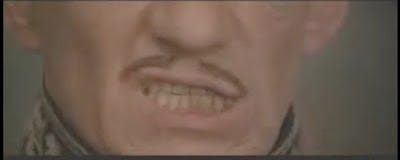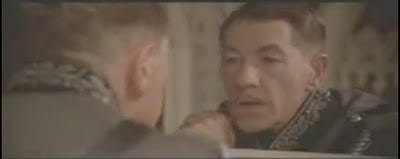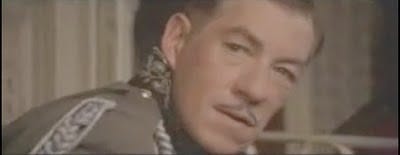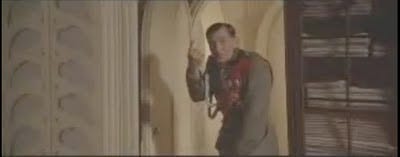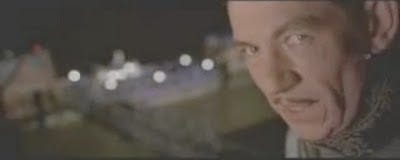THE FIRST SOLILOQUY IN IAN MCKELLEN'S RICHARD III
Ian McKellen begins his 1995 film of Richard III with the Lancasters' defeat and the murder of Prince Edward and his father Henry VI. After an opening title, we see the Yorks celebrating their victory: talking, laughing, dancing, and listening to Stacey Kent singing Christopher Marlowe's "Passionate Shepherd to His Love." As Kent finishes the song, we hear a squawk from another microphone as Richard prepares to speak. He delivers the first couplet—"Now is the winter of our discontent / Made glorious summer by this son of York"—and looks at his brother Edward. The crowd laughs at his wit and applauds his subsequent, triumphant lines.
The mood changes when he says, "Grim-visaged war hath smoothed his wrinkled front." The camera moves closer to his own visage, focusing on his teeth as he talks of frightening his adversaries' souls.
Though still in the speech's first third, in which Richard celebrates peace under the Yorks, we are headed toward something different. When we reach the couplet, "He capers nimbly in a lady's chamber," we move to a different chamber, a men's room, where Richard unbuttons his fly as he talks of "the lascivious pleasing of a lute." The change of setting emphasizes that he describes peace negatively, as being corrupt and "lascivious."
He urinates as he begins the speech's second third—"But I, that am not made for sportive tricks / Nor made to court an amorous looking glass"—then buttons up and walks stiffly toward the room's looking glass, his gait imitating what he says about "halt[ing]" past barking dogs. Before the mirror, he washes his one good hand and dries it, beginning stage business that we'll see throughout the film: the one-handed lighting of cigarettes, putting on gloves, taking off rings, pouring drinks, and so on. When he speaks of looking at his shadow and "descant[ing] on [his] own deformity," he illustrates his words by looking at himself in the mirror. He then leans closer, examining his face as he speaks lines from the character's first soliloquy, in The Third Part of Henry VI: “Why, I can smile, and murder whiles I smile / . . . And wet my face with artificial tears, / And frame my face to all occasions.”
As he contemplates one of his best weapons, his face, he seems to realize we've been watching. He looks at us in the mirror, then directly at us as he begins the soliloquy's last third: "And therefore since I cannot prove a lover / . . . I am determinèd to prove a villain."
He goes to the door, opens it, and says, "Plots have I laid," then gestures with his little finger, inviting us to see the results of his schemes.
We then move outside, above a dock, where Richard finishes the speech by telling us that he has set the king against their brother Clarence.
Here it is, with the rest of the scene.



